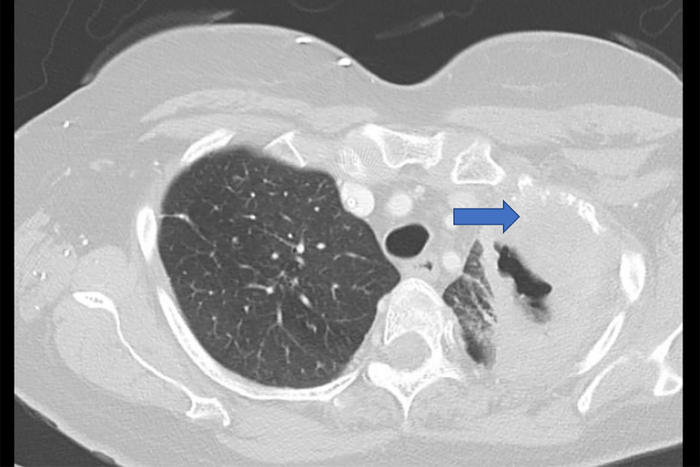Researchers at Washington University School of Medicine in St. Louis are leading a national study aimed at identifying patients with early-stage lung cancer who are at high risk of having the cancer return, even after surgery and chemotherapy appear to have eliminated their tumors. The research is supported by a $5.3 million grant from the National Cancer Institute of the National Institutes of Health (NIH).

Credit: Washington University School of Medicine in St. Louis
Researchers at Washington University School of Medicine in St. Louis are leading a national study aimed at identifying patients with early-stage lung cancer who are at high risk of having the cancer return, even after surgery and chemotherapy appear to have eliminated their tumors. The research is supported by a $5.3 million grant from the National Cancer Institute of the National Institutes of Health (NIH).
Non-small cell lung cancer is the most common cause of cancer-related death globally and is largely caused by smoking. If caught before it spreads to other parts of the body, this type of lung tumor sometimes can be cured with surgery and chemotherapy. But about half of such patients will experience lung cancer recurrence, and doctors have no way to identify which patients are at the highest risk of having their tumors return
“We don’t have a test that we can do right after surgery to analyze the tumor and predict how the cancer will behave in the future, even in early-stage lung cancer,” said principal investigator Ramaswamy Govindan, MD, the Anheuser Busch Endowed Chair in Medical Oncology at Washington University. “This ability to predict recurrence will become even more important as our lung cancer screening programs increase and our imaging technology improves, because we will diagnose more stage 1 disease. We want to see if we can identify molecules in the tumor — DNA, RNA or proteins, for example — that, when present, predict which tumors will recur and which won’t.”
Govindan and his colleagues at Siteman Cancer Center at Barnes-Jewish Hospital and Washington University School of Medicine will analyze tumor samples from patients participating in a group of national clinical trials aimed at improving lung cancer therapies. The trials, also co-led by Govindan, are being conducted at 1,242 sites across the country and include about 8,000 patients.
The suite of phase 3 trials — called the Adjuvant Lung Cancer Enrichment Marker Identification and Sequencing Trials (ALCHEMIST) — include investigations of the effectiveness of a drug called erlotinib, an EGFR inhibitor for patients with tumors harboring a specific mutation in the EGFR gene. Another study will look at the effectiveness of checkpoint immunotherapy for patients who do not have this specific mutation. Patients receiving the investigational therapies also will receive standard surgery and chemotherapy, and their outcomes will be compared to those of patients receiving standard surgery and chemotherapy alone.
The new grant will support a Proteogenomic Translational Research Center, led by Washington University and their collaborators at the Broad Institute of MIT and Harvard, that will analyze lung tumors from a representative sample of the patients participating in these trials. The analysis will include a deep dive into the genomics and proteomics of the tumors, meaning they will seek patterns emerging at the gene and protein levels that could flag a tumor as being likely to return. The research center is part of the NCI’s Clinical Proteomic Tumor Analysis Consortium (CPTAC).
“The advantage of doing this analysis within the existing clinical trials is we can identify patients who will do poorly not only after standard treatment — surgery and chemotherapy — but also among those who also received EGFR inhibitors or immune checkpoint inhibitors in addition to standard therapy,” Govindan said. “This also means we could use protein-based biomarkers to identify patients who are likely to do well with these various treatment strategies.
“We are optimistic that this comprehensive analysis from well-curated samples collected in the setting of a clinical trial will provide the best conditions to discover biomarkers of cancer recurrence at the gene and protein level,” he added. “If we know who is at high risk of recurrence, we can focus our research on that group. We can investigate the biology of these badly behaving tumors to find out what is driving them, which could lead to new innovative therapies.”
###
This work is supported by the National Cancer Institute of the National Institutes of Health (NIH), grant number 1U01 CA271402.
Washington University School of Medicine’s 1,700 faculty physicians also are the medical staff of Barnes-Jewish and St. Louis Children’s hospitals. The School of Medicine is a leader in medical research, teaching and patient care, and currently is No. 4 in research funding from the National Institutes of Health (NIH). Through its affiliations with Barnes-Jewish and St. Louis Children’s hospitals, the School of Medicine is linked to BJC HealthCare.




